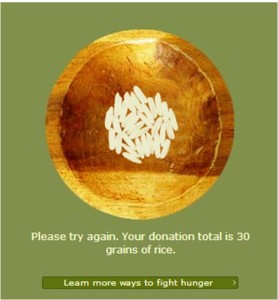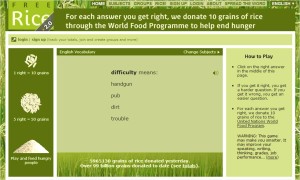Freerice.com is a site so cool, you have to see it to believe it. When you first enter the site, you will see something like this:
You would click on “trouble” as the synonym for “difficulty,” and proceed to the next level, which will have slightly more difficult words. Eventually you’ll be picking synonyms for words like agrestal and lanuginous. Or, if vocab isn’t for you, you can change the subject to geography, visual art, German, grammar, the periodic table, and several others. It’s a fabulous, fast way to keep sharp between Netflixing and Redditing and Facebooking and Tweeting and looking at pictures of cute animals.
But the incredibly fabulous thing about Freerice is that each correct answer earns ten grains of rice for countries suffering from chronic hunger. This is an operation of the United Nation’s World Hunger Programme, so don’t be fooled by the .com. Once you start answering the questions, a rice-bowl will appear next to the interface with a running total of the rice you’ve accrued.

If you think this site is too good to be true, you’re in good company. So how does this work, exactly? The site’s FAQ explains it well:
Freerice is not sitting on a pile of rice. You and other Freerice players earn it 10 grains at a time. Here is how it works: when you play the game, sponsor banners appear on the bottom of your screen for every correct answer that you choose. The money generated by these banners is then used to buy the rice. So by playing, you generate the money that pays for the rice donated to hungry people.
I have been singing the praises of Freerice since I discovered it several years ago. It’s a fun thing to do to pass the time and can actually be pretty helpful if you’re trying to brush up on your French or even do some SAT prep.
Freerice is an intersection of the Humanities and humanitarians. We’ve spoken in class about how social media sites like Twitter are all about brevity, about abridging information so that it can catch your attention as you’re sailing through the 27 windows you have open. While some (myself included) may worry about how that’s affecting our ability to focus on reading longer pieces of literature, others have embraced and made the most of this change. Freerice takes advantage of our shortening attention span, demanding only perhaps five seconds for each question. Best of all it, it takes us from social reading to social change, reminding us that engaging with the Humanities from a dorm in New York can have profound implications all over the world.


I seriously love Freerice and I’m so glad you wrote a post about it. The site has won numerous awards as well, which I think it deserves, for being such a great humanitarian/humanities bridging powerhouse. When I have my own ELA classroom I am absolutely making this a staple of our warm-up activities.